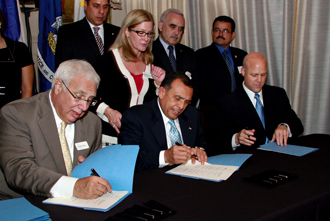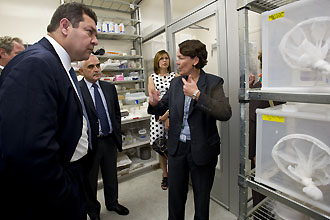Universities Partner With Honduras
Honduran President Porfirio Lobo and members of his cabinet came to Tulane University on Tuesday (Sept. 7) to sign a memorandum of understanding with seven New Orleans universities.

Signing a memorandum of understanding are, from left, Tulane President Scott Cowen; Honduran President Porfirio Lobo and New Orleans Mayor Mitch Landrieu. (Photo by Guillermo Cabrera-Rojo)
During a reception Tuesday night at Tulane President Scott Cowen's home, Lobo called the memorandum of understanding “very important to Honduran students.” Tulane and the other universities pledged in the agreement to bring Honduran students to New Orleans to study, as well as trade curricula with the Universidad Tecnologica Centroamericana, a prestigious private institution in Honduras.
The universities also agreed to send faculty and staff members to Honduras to provide guidance on rebuilding public education and healthcare systems, two areas Tulane has focused on after Hurricane Katrina.
Earlier in the day, members of the Honduran delegation, including Dr. Arturo Bendana, secretary of health, and Dr. Javier Pastor, deputy secretary of health, met with researchers at the Tulane School of Public Health and Tropical Medicine to discuss prevention of dengue fever.

Honduran cabinet members tour the laboratory of researcher Dawn Wesson, right, at the Tulane School of Public Health and Tropical Medicine. (Photo by Paula Burch-Celentano)
According to the cabinet members, Honduras has endured a widespread outbreak of dengue fever during the summer, causing thousands to fall ill and leading to more than 100 deaths. Dean Pierre Buekens and Dawn Wesson, associate professor in the Department of Tropical Medicine, met with the health secretaries along with guests from the New Orleans Mosquito and Termite Control Board and the Louisiana State University School of Public Health to discuss potential collaboration with the Honduran government.
“The meeting was a great opportunity for us at Tulane and, more broadly, in New Orleans to build on our long-standing relationship with Honduras,” Wesson said. “The current dengue outbreak there reflects the broader dengue problem throughout much of Mexico and Central and South America.”
Since an effective dengue vaccine is not yet available, the strongest efforts must go toward providing the best advice on what is effective for vector mosquito control and for dengue prevention, she said.
“Today's meeting allowed us to begin to discuss how we can establish collaborations to work on dengue prevention activities and other important public health problems.”
